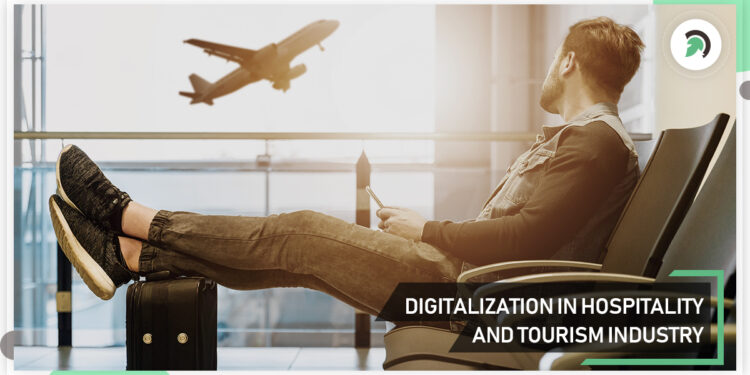In the past few years, we’ve seen a tremendous digital transformation in industries
like healthcare, retail, finance, media, and entertainment. Today, we are looking at an industry that has undergone a complete overhaul in recent years due to the extreme digital transformation: Tourism and Hospitality.
From the early 1990s to the year 2000, most of us visited a brick-and-mortar travel agent whenever we had to plan our family vacations or work tours. Those days are gone, when people had to stand in large queues to book railway tickets. Today, thanks to mobile integration and Online Travel Agencies (OTAs), they are playing a much bigger role in customizing the user experience. Now you can easily book railway tickets over the internet. The same case follows with airline tickets or bus tickets, which can be booked online in seconds. You can even find a hotel that suits your style and conditions and gets them booked online in no time.
With the rise of the Internet and the arrival of the digital trend in the travel world, online travel agencies or OTAs have become the leading marketing channel in the travel business. Famous brands such as Expedia, Travelocity, Priceline, or MakeMyTrip (MMT) controls the worldwide travel market with 95% market coverage in the US alone.
According to a technical report by Phocus Wright’s, online travel agencies earned more than $ 19 billion in gross hotel bookings only in the USA. Travel Industry masters such as MMT and Expedia expanded their refined marketing channels into the series of hoteliers as well. The fruitful benefit of these OTAs is that a traveler can compare the traveling options like location, time, price, and availability of their desired hotels under one roof.
OTAs had crossed gross bookings of over $150 billion last year, which is around 38% of the total online global market and 15% of the global travel market. The sales figure for online travel agencies is growing at the rate of 12% annually, which is spanned across both hoteliers and travel booking segments. Today, with the evolution of digitization and strategic alliances Online Travel Space is growing its roots rapidly. There is a question on everyone’s mind, whether the rival digital trend will affect the traditional travel agents or brick and mortar travel agencies.
Drop in the traditional travel agent business
With the arrival of OTA’s, it looks like the brick and mortar agencies have reached their final breath. Although reports say that places like Australia have travelers who prefer in-person booking in most of the cases. In fact, 50 percent of Australians travelers traveling overseas booked a travel agent rather than an OTA.
OTA’s appears to be a discursive reason for believing that traditional travel agents have inhaled their last breath, as some reports also cover the fact that travelers in countries like Australia and New Zealand prefer personal bookings rather than booking it online. In fact, 50% of Australians traveling abroad use a travel agency because of personal touch and customized booking options.
The question that took heat among travel agents are:
Should a travel agent take hotel API to lead in his business domain?
Should a travel agent have his online portal to achieve business targets?
We suggest the following 3 steps as the remedy for the traditional travel agents to buck up the fight against the modern OTAs:
1. Invest in technology and online marketing channels
Sovereign travel agents mostly ignored the benefits of digital marketing and technology for a long time. Travelers are getting smarter day by day, so need to travel agents as well to buckle up the fight and give competition to OTA. Every customer with a smartphone today have access to Google Search. So it’s important for travel agents to stay updated with the latest travel trends in the world to meet customers likes and dislikes. In addition to the exceptional offline service, it is also important for a travel agency to make a good booking page where customers can search and book their tickets easily. To do this, travel agents can opt for a good travel agency software with back-office features to automate common tasks. In addition, the agencies should maintain clear and responsive review options to build trust among their customers.
2. Build a strong social media presence
Social media platforms such as Yelp, Facebook, Twitter, and Instagram, etc. have a gigantic impact on the traveler’s world. It is the need of the hour for every travel agent to stay updated and post regularly about their local events, culinary distinctions, and special promotional offers during the festive season. Regular and engaging content on social media helps in better demographic targeting resulting 2x leads.
3. Attractive web presentation
Many independent agents don’t have any online presence. To get more customer interaction one need to maintain responsive marketing landing pages with proper images, promo slides, and testimonials. Online presence also serves as the credibility of a company in the digital world as customers can read reviews, and make opinions through their web presence.
Booking Trends
Digitization makes traveling more affordable, accessible and convenient than ever before. For example, today’s online travel portals allow you to compare and book hotels, airline, train as well as bus tickets at the prices that suit your budget. With the advent of digital technologies, the overall picture of the travel industry is changing. It allows customized user experience, allowing the travelers to fully control trips which suit their budget and preference.
A study conducted by the US Travel Booking website found that travelers read between 6 and 12 reviews before booking a hotel online. An excellent example in this regard is the hotel reviews posted on travel portals by real travelers. These reviews come directly from the real travelers from that website, which are in most cases authentic and impartial to those who have direct ownership. In the end, these reviews are important in determining the popularity of a hotel. Hotels which have the best reviews and positive feedback from the customers are getting maximized sales as compared to others.
6 Ways why OTA gets more conversion than traditional travel booking agencies
1. Mobile Integration
The digital transformation is a dream come true for homies who loves to travel. With the rise of OTA applications like MMT, Trivago, Expedia and more, customers can book their tickets, reserve hotel room right from their phones without visiting any traditional travel agents. In fact, they can plan a complete vacation or a work trip from home no matter what the time is. Without a mobile presence, OTA companies can’t even imagine existing!
According to the Criteo Travel Flash Report, more than the one-third population of the world uses a smartphone to book a hotel room. The report also outlined that online travel agencies (OTAs) clutched an impressive record of 45% of mobile bookings.
Interestingly, according to the report, the Middle East and Asia are ahead of Europe and North America in case of mobile reservations. The mobile reservations in Asia are around 45% to 49%, they account for more than 53% transactions in the Middle East. On the other hand, the chart for North America and Europe are between 28% to 33%, respectively. All of this data clearly shows the growth of OTA’s booking in recent years. According to the report, web and app bookings covered almost 90% of total travel bookings in the world.
2. The rise of AI and Chabot’s
You have probably seen a welcome brochure or menu on the hotel desks where they defined what items they have in their menu, a map of their hotels, the services they have and everything you need to know? Nowadays, with the integration of AI and Chabot’s all these functionalities can be displayed online through AI-based applications and technology. Customers can directly access all the information’s right from their phone at their comfort, in the form of an electronic concierge.
Applications like Dine-out even gives access to voice-activated chat rooms that open curtains, set alarms, or even book a table without having a human touch. At Hotels in Las Vegas, you can even find a robot of different names that help you to quickly process your request. Marriott which is an American multinational diversified hospitality company that manages and franchises a broad portfolio of hotels uses AI chatbots in nearly 5,000 hotels to change reservations, check account balances and reimburse coupons.
3. Integration of the Internet of Things
Today, every website use a cookie to analyze customer data and their likes and dislikes. Today we all are connected to the Internet of Things (IoT) and the tourism & hospitality industry use our data to improve the customer experience. For example, you have probably seen a lot of time if you are looking for hotels online. You see ads of hotels on every website you visit after that, it all happens due to cookies saved by the websites.
IoT can be helpful in other things as well like, if your customer has visited your hotel every year for the past three years, you can automatically remind them before if they want to make another reservation this year. By this, you can save your customer and get them a reserved room without bothering your customer. This can be used on other services as well like, the choice of food your customer loves, outings and services in the room and more. The opportunities in the OTA market are endless with the involvement of digital technologies.
4. Focus on Data
In the Digital world, it’s important to analyze our customer behavior and their preferences to offer them satisfactory services. Data plays an important role in the hospitality and tourism industry after digitalization. For example, if you are booking a hotel room through OTA websites and missed to complete the payment for the same. There you see, you receive constant follow-ups and reminders through notifications that you are a step away from booking your room. They use customer data to determine the reason for restricting to avail the services. Measuring data frequently help them to maintain their services and if there are any queries bothering customers to avail their services, they can fix them immediately.
5. Ease of Access
Today, it takes a minute or two to book hotels online through travel websites. But, this comfort also brings certain pros and cons to OTA markets. The customer can share their opinions and reviews instantly through Yelp, Facebook, TripAdvisor, and other OTA websites. Technology has led hotels and restaurants to focus more on providing quality customer service. It’s a huge possibility that a customer can publish poor reviews if not satisfied. There is no doubt that the trend is towards providing better service to customers, ignoring this factor may display a bad reputation for a business.
6. Virtual Reality
Whether it’s a hotel, a tourist destination or a museum, virtual reality allows you to explore the place without leaving your room. The motive of virtual reality is to provide the actual insights of the destination what real customers are experiencing or to the place you are planning to visit. (For example, if you are paying $ 3,000 for a trip to Paris, you can explore that place at your home through virtual reality in just $100) This is not yet happening on a large scale, but some major players in the travel industry are offering customers the option of virtual reality to enhance the travel experience.
The travel and tourism sector is worth $ 1.3 trillion this year and with the rise of virtual reality trends, there’s a huge probability that it will increase rapidly over time. Early this year, we’ve seen the involvement of virtual reality in the eCommerce sector which gave fruitful results. Virtual reality aids as a blessing for the people who can’t visit places due to health issues. They can experience the same environment by relaxing in their home.
Conclusion
In this digital era, we all are in the generation of independent travelers who mostly plan, book and manage travel trips or traveling tickets through online travel agencies or OTA. The era of traditional agencies and independent travel agents is almost over. While digital transformation has brought 90% of the travel agents and tour business to the brink of extinction, survivors have to adapt digitization to overrule the reckless competition.
In order to serve the customers better, one could lift their business with the latest emerging technology like virtual reality to attract customers in their field. Digital transformation has flooded the entire travel ecosystem, resulting in a huge increase in competition. Surviving without digitalization is not possible for traditional travel agencies in the modern internet world where there are big players available online just a tap away from a customer’s smartphone.
According to the World Tourism Organization, the number of international tourist visits worldwide increased by 3% to 4% this year, compared to 1526 million in the year 2017. The global business of the travel industry is $ 1.3 billion today. It is, therefore, necessary for travel agents to invest in a digital transformation in order to survive in the marketplace. With the parallel upsurge in travel demand, shifting the way to digital will be the key factor to meet the expectations of travelers in the future.





